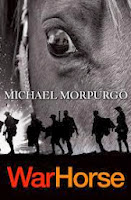At 11am on the 11th of November 1918 the First World War ended after 4 years of fighting and the death of millions of soldiers. Ever since the 11th of November has been the day when people remember those who have died in wars. As a mark of respect for the dead at 11am on the 11th of November, in Britain, there is a two minute silence.
After the First World War, red poppies were among the only plants to grow on the battlefields in France. Today we wear poppies as a symbol of remembrance.
Learn more about Remembrance Day and some of the many wars fought by visiting the Library to see the display of books, both fiction and non-fiction, about war and its aftermath.





















